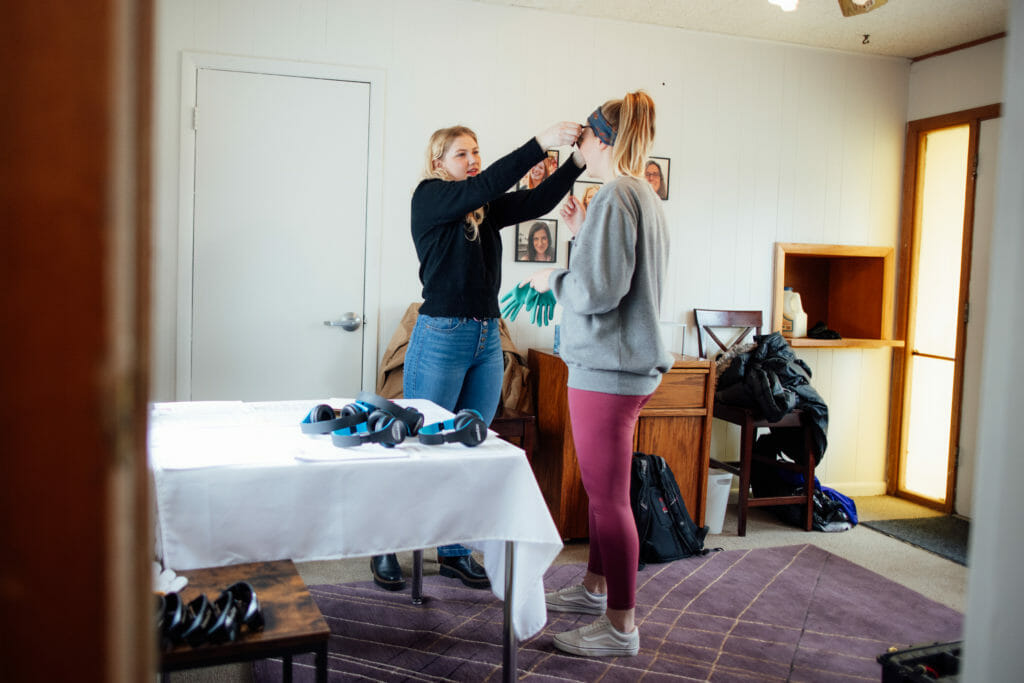
A bird chirping. An air conditioner rumbling. A gentle hug. These may all seem like innocuous daily occurrences, but for a person with Alzheimer’s disease or dementia, these events can cause confusion, anxiety or physical discomfort, according to Elaine Eshbaugh, Ph.D., professor of gerontology at the University of Northern Iowa.
In an effort to raise awareness of just how much dementia changes how someone experiences the world, Eshbaugh recently helped launch a “dementia simulation house” near the UNI campus, powered by Dementia Live. Through goggles, headphones and gloves, the house allows visitors to experience how someone lives with the disease’s alterations to their sight, sound and touch.
“What we’re trying to do is educate people in the community, so that when people with dementia seek out their services, they’re a little bit more understanding,” Eshbaugh told McKnight’s Home Care Daily Pulse. “Our goal really is to keep people with dementia in the community just a little bit longer.”
Currently, 4 out of 5 people with dementia live at home, not in an assisted living or skilled nursing facility. And the population, numbering 6.5 million people with Alzheimer’s alone in the United States, could more than double by 2050, based on some projections, as a result of the aging baby boomer generation.
Seeing a different world
Eshbaugh noted how important it is for home care workers to understand how much dementia affects a patient’s vision. As the disease progresses, patients lose their peripheral vision and depth perception.
“Our brains are incredible because we see two images, one out of each eye, and our brain is smart enough to just cleanly put those two images on top of each other,” she said. “Your brain loses that ability when you have dementia.”
Several tactics can help caregivers when it comes to making a patient with dementia feel more comfortable, however. When you first enter the room with someone with cognitive deficits, for example, Eshbaugh recommends stopping about 6 feet away from them, introducing yourself and then allowing them to process you before beginning to move into what might be their personal space.
She also suggests that a home care worker avoid getting too close to a patient when initiating a conversation.
“If you are too close to someone and right in front of them they might forget where they are because all they see is you,” Eshbaugh said. “That can be very intimidating and they can lose track of where they are.”
No such thing as background noise
Dementia also alters patients’ sense of hearing, Esbaugh said.
“With dementia there’s no such thing as background noise,” she said. “All the sounds that you hear, whether it’s a bird chirping outside or a clock that is ticking, a TV in another room or someone trying to have a conversation with you, all of those sounds are of equal importance and your brain has to try to prioritize them because it doesn’t automatically do that like our brains do.”
She emphasized that caregivers really need to focus on minimizing extraneous noise. She added that at home, you might be able to have a conversation with the TV on but someone with dementia may not be able to do that because they’re unable to block that noise out, Eshbaugh said.
Often, noises we don’t even notice, such as an air conditioner that’s rumbling or a ceiling fan that’s making a humming noise will compete with your voice for a patient’s attention.
“Just being aware of that and doing what you can to provide a quiet space with minimal extraneous noise so that their brain doesn’t have to work as hard to identify your voice and respond to you can go a long way,” she said.
Broken messages
Dementia also affects a patient’s sense of touch, Eshbaugh said. For example, with the disease it’s harder to do things such as button a shirt or start a load of laundry because the messages between your body and your brain are broken.
Dementia patients also may lose the ability to interpret temperature, so they may take a bath in scalding hot water or wander outside in the winter in shorts and a T-shirt.
Caregivers can be sensitive to these issues by simply alerting patients anytime touch might be involved, so they know what to expect.
“Keep in mind that as anxiety goes up, cognition goes down, so the more anxious you make someone who is living with dementia, the less likely they are going to be able to have a typical conversation or do what they need to do around the house,” Eshbaugh said. “Your goal as a caregiver is really to keep that anxiety level low.”



